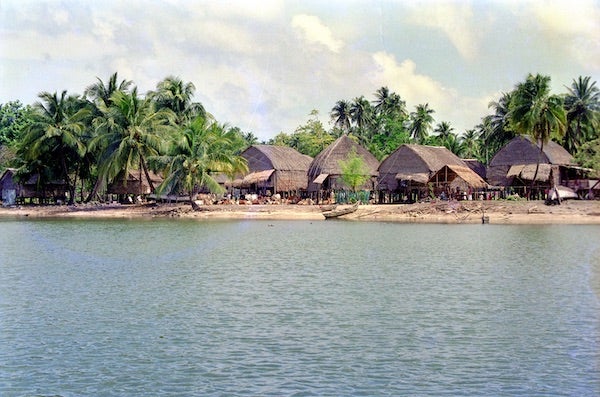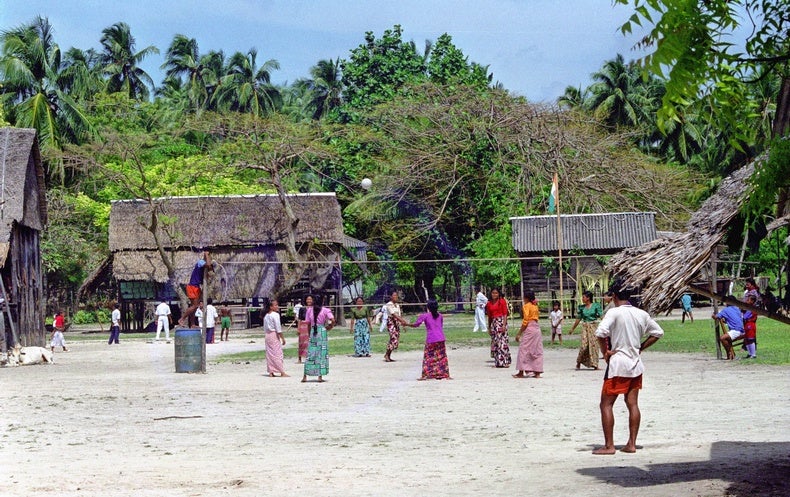While making an intermittent phone call to the remote Nicobar Islands, I told Ayesha Majid, the indigenous leader, that my friends in Delhi fell like flies. The terrible second wave of COVID-19 is sweeping across India; the crematorium has run out of wood and the cemetery has run out of space. “Brother, what’s going on?” She asked incredulously.
Earlier this year, COVID made a comeback in India. During the week of May, the country contributed more than half of the COVID cases reported daily worldwide.The number of COVID deaths in Indian cities is now decreasing, but people in rural India have been dying In groups.
However, so far in the second wave, almost 24,000 The indigenous people of Nicobar living on 11 small islands in the Bay of Bengal have not recorded a single infection.The Nicobar Islands are not only home to these indigenous people, but also more than 13,000 Officials, defense personnel and settlers from the Indian mainland. At the beginning of the pandemic, they traveled from the neighboring Andaman Islands to this remote outpost and inadvertently brought the virus there.
But despite the initial panic, the trauma of the past Devastating earthquake and tsunami, Illiteracy, poverty, lack of the most basic facilities, and distance from clinics and hospitals (severely ill Nicobar people usually have to go to a hospital in the Andaman Islands and sail for up to 30 hours at sea) This remote community manages to protect itself from the pandemic. Its experience shows that top-down policies that ignore regional and cultural values do more harm than good—and their bottom-up approach to self-protection provides important lessons for other disadvantaged communities around the world.
On March 24, 2020, the Prime Minister of India ordered Sudden 21 days caused by coronavirus nationwide blockade, Restricting more than 1.38 billion people to their homes. Overnight, millions of poor Indians—Migrant Workers, Day labor, Smallholder, This Homeless and Oppressed caste members And the tribe-found himself in an extremely dangerous situation. The blockade was eventually extended to 68 days in phases.between The strictest in the world, It precipitated a Tragedy, To promote mass migration and coercion 75 million People below the poverty line.
The day after the announcement, several Nicobar leaders gathered nervously on Kamota Island, a small piece of land in the vast East Indian Ocean. When Majid, chairman of one of the tribal committees, explained the situation, memories of past traumas began to haunt the gathering. In December 2004, a fatal Tsunami The humanitarian aid that followed has devastated Nicobar society. Many indigenous leaders are beginning to worry that similar disasters will once again loom over their communities.
In this remote tribal reserve, concepts such as epidemics are completely unfamiliar, and the sudden blockade has triggered a new crisis. When the local government ordered the Nicobar people not to leave their homes, many people did not understand why they were suddenly banned from fishing, hunting and caring for coconut plantations-activities that are vital to their survival. The police told them that a deadly virus was raging, killing victims indiscriminately all over the world; and that even the most advanced and resourceful government failed to suppress it. The Nicobarians learned that social distancing, self-isolation and wearing masks are the only ways to fight against this virus.But these measures are incompatible with their worldview. Indigenous peoples have a strong sense of community, live in large families of multiple generations, and share resources generously.
To make matters worse, the traumatic memories of the tsunami surfaced again, paralyzing the Nicobarians and panicking.. In 2004, a huge wave destroyed the Nicobar people in the blink of an eye 3,449 Live according to official statistics (and 10,000, Or according to estimates by independent researchers, approximately one-third of the Nicobar community). Those who survived were so traumatized that they could not bear to watch the sea for months. The Nicobarians believe that COVID is a similar imminent disaster. As memories of past traumas recovered, their mental health took a hit. Many people can’t help but worry that the virus is lurking in their tropical forests, on their beaches, or secretly waiting to catch them outside their houses. Some people think that the age of mankind is finally over. Many people think they will definitely die.
At this critical moment, Majid persuaded the village chiefs of the central Nicobar Islands to adopt a consistent COVID-19 response to support their shaky communities. They rely on tradition and science. They provide counseling to panicked people, patiently solve their endless questions, and break some myths. A group of women began to sew masks and distribute them to Nicobar and local civil defense personnel.The tribal committee has set up a special quarantine facility to simplify and disseminate important information related to the coronavirus in Nicobar language, and calls on the indigenous people to implement self-regulation and quarantine, wash their hands frequently and Special care for the elderly. The council also set up many temporary grocery stores in the village to prevent venturing to the larger market, and deployed a team of volunteers to prohibit people from entering or leaving the village.

Although the emotional support immediately boosted the morale of the community, the spread of scientific knowledge about the virus prepared the islanders to fight off infectious diseases. After the tsunami, the traditional livelihoods of the Nicobar people were eroded, and many families are now living in precarious conditions. The sudden blockade exacerbated their plight.The lifestyle changes after the tsunami also brought Previously unknown disease For example, with diabetes, if indigenous people are infected, they will be more susceptible to serious diseases. Therefore, the tribal committee did not adopt a one-size-fits-all approach, but instead focused on marginalized groups and addressed their multi-level vulnerability. For example, they prepared a list of poor families and provided them with necessities. This kind of assistance is the lifeline of many people; when the volunteers reached out to remote villages, they found that several households had no food. “They have nothing to eat. Many people can’t contact anyone because they don’t have a cell phone or TV to receive or exchange information. They are very scared and don’t know what to do,” Majid said.
Despite the blockade, India’s coronavirus cases are still increasing rapidly, but due to the remoteness of Nicobar, the Indians are temporarily safe in their villages. However, when travel restrictions on the Andaman and Nicobar Islands were relaxed in May 2020, thousands of residents trapped in the Indian mainland began to return, some of whom were carrying the virus. The tribal committee was shocked: In a tightly integrated traditional society where people live in houses for generations, a single case of coronavirus is enough to destroy indigenous communities.
In the past five centuries, aliens Bacteria and epidemics The spread of European colonists has wiped out many indigenous societies around the world.This Tragic fate Neighboring Greater Andaman, they imported Epidemic Almost disappeared in the 19th century, reminding Nicobar leaders of their own unique weaknesses. As a historically isolated community, the Nicobar people are highly susceptible to foreign diseases, and the inadequate public health system exacerbates this vulnerability.Therefore, maintaining isolation-the natural protection against infectious diseases enjoyed by the Nicobar people-is vital to their survival
The tribal committee began lobbying the local government, pleading limit The migration of people to the Nicobar Islands. Even so, only after the coronavirus has infected people in the north and south of the Nicobar Islands, the government banned travel to these islands, which are home to large numbers of mainlanders. Fortunately, everyone survived, and the disease did not spread due to the efforts of the infected and their families to follow the COVID protocol. The tribal committee ensures that the Nicobar people supervise each other and immediately report any COVID symptoms to their leaders.
In this way, the people of Nicobar successfully contained the spread of the first wave of pandemic and seemed to escape the second wave. Now that the Indian government has started a COVID-19 vaccination campaign in the archipelago, tribal leaders have once again played a key role in dispelling vaccine-related myths. Majid leads by example and encourages her community to receive injections fearlessly.
Nicobar’s response has provided some important lessons for the effective management of the pandemic. Indigenous peoples are able to survive the crisis successfully because their leaders act quickly, collectively and selflessly; embrace the power of tradition and science; implement democratic decision-making; create space for active community participation; emphasize accountability, integrity and transparency ; Ensure equal participation of women; and prioritize the needs of disadvantaged and marginalized groups.
All over the world, the poor, disadvantaged, and marginalized parts of society are being disproportionately affected by the pandemic. However, careful observation also revealed that some indigenous communities are actively fighting the epidemic and using their community connections to effectively protect themselves. It is time for us to learn from the unique worldview and fair and inclusive response of these indigenous communities to the pandemic.
This is an opinion and analysis article; the views expressed by the author or author are not necessarily Scientific american
